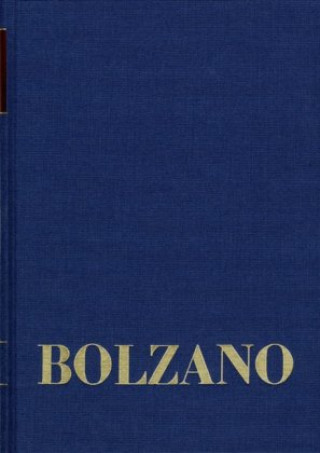
Kézbesítés
Vásárlási tanácsadó





Nem vált be? Semmi gond! Nálunk 30 napon belül visszaküldheti
 Ajándékutalvány
bármilyen értékben
Ajándékutalvány
bármilyen értékben
Ajándékutalvánnyal nem nyúlhat mellé. A megajándékozott az ajándékutalványért bármit választhat kínálatunkból.
Bernard Bolzano Gesamtausgabe / Reihe II: Nachlaß. B. Wissenschaftliche Tagebücher. Band 12,2: Miscellanea Mathematica 22
 Német
Német
 726 b
726 b
 hamarosan
hamarosan
 Megjelenés ismeretlen
Megjelenés ismeretlen
30 nap a termék visszaküldésére


The notes of part 22 of the 'Miscellanea Mathematica' were written between July of 1830 and August of 1832. Bolzano's natural philosophy of his later years was based on the assumption that the entire universe had a nuclear particle structure. Unlike the classic atomist, he believed that there was an atom at every point in space. Thus there is no vacuum. This means that no substance is isolated. This made him question the opposite view which he had expressed previously in the 'Athanasia'. His refutation in the second edition of the 'Athanasia' is given in detail in the 'Miscellanea Mathematica'. At the beginning of the 'Miscellanea Mathematica 22', he dealt with the definition of the concepts of space and time. According to Bolzano, the traditional definitions of the concepts of line, surface and solid were in need of improvement, and this induced him to give a detailed explanation. During the years of his reclusiveness after his dismissal in 1819 from his position as head of the department for religious studies at the University of Prague, Bolzano had been studying the logical foundations of mathematics and the foundations of logic. These studies were reflected in his theory of science. When he returned to pure mathematics after about a decade, he began work on a new encyclopedic work, the 'Größenlehre', (Theory of Quantities). The notes in this volume contain a precisely structured plan of this work from the year 1831. In explaining the first arithmetical terms, Bolzano tries to avoid abstract terms. Some abstract terms are imaginary. Referring to contemporary scientific journals, he gives a report on imaginary and irrational quantities in the theory of numbers. On the basis of Legendre's discussion of Galois' problem of the solvability of algebraic equations, Bolzano suggests a simple method. He gives a detailed account of Gergonne's geometric treatment of Newton's method of finding the roots of a numerical equation by approximation and provides a counterexample for Fourier's assertion that a characteristic of the existence of the real roots of an equation also applies to transcendental roots. Furthermore he tries to find a simpler formulation of Cauchy's proof that each polynomial has a complex root. Bolzano studies the proof provided by several famous analytic theorems. He mentions Cauchy's simple and strict proof of Taylor's theorem and Crelle's attempt to expand this within the context of general theory of analytic functions. He studies Cauchy's theory of the infinite, examines several theorems and works his way around to the theory of tangency and discusses infinite series. There are no infinite large and small numbers, these terms are meaningless. The pivotal concepts of continuity and continuous functions are dealt with in several places. What is particularly remarkable is the discussion of the determinability of the functions. There was deemed to be a discrepancy between Bolzano's theory of functions and his paradoxes of the infinite. One way to eliminate this discrepancy would be to find an exact definition of the concept of determinability. A continuous function f is exactly determinable when the difference (x+ x) -f(x) retains the same sign within certain values of x irregardless of how close they may be. Thus a determinable function is a continuous, piecewise monotonic function.
Információ a könyvről
 Német
Német
Kategória




 Hogyan vásároljunk
Hogyan vásároljunk















